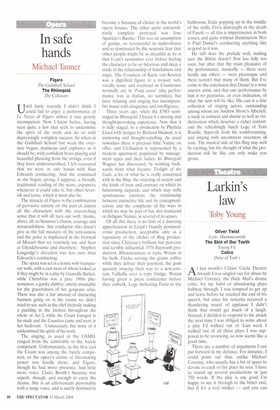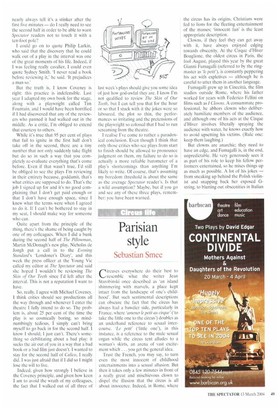Larkin's law
Toby Young
Oliver Twist Lyric, Hammersmith The Skin of Our Teeth Young Vic Calico Duke of York's
At last month's Critics' Circle Theatre Awards I was singled out for abuse by Michael Coveney, the Daily Mail's drama critic, for my habit of abandoning plays halfway through. I was tempted to get up and leave before he reached the end of his speech, but since his remarks received a thundering round of applause I didn't think that would get much of a laugh. Instead, I decided to respond to his attack the next time I was obliged to write about a play I'd walked out of. Last week I walked out of all three plays I was supposed to be reviewing, so now seems like a good time.
There are a number of arguments I can put forward in my defence. For instance. I could point out that, unlike Michael Coveney, who usually has a bit of space to devote to each of the plays he sees. I have to round up several productions in just 750 words. If the play is any good I'm happy to see it through to the bitter end, but if it's a real stinker — and you can nearly always tell it's a stinker after the first five minutes — do I really need to see the second half in order to be able to warn Spectator readers not to touch it with a ten-foot pole?
I could go on to quote Philip Larkin, who said that the discovery that he could walk out of a play in the interval was one of the great moments of his life. Indeed, if I was feeling really cavalier, I could even quote Sydney Smith. 'I never read a book before reviewing it,' he said. 'It prejudices a man so.'
But the truth is, I know Coveney is right: this practice is indefensible. Last year I adapted my own book for the stage, along with a playwright called Tim Fountain, and I would have been horrified if I had discovered that any of the reviewers who panned it had walked out in the middle. As a critic, I'm obliged to extend that courtesy to others.
While it's true that 95 per cent of plays that fail to ignite in the first half don't take off in the second, there are a tiny number that not only suddenly take flight but do so in such a way that you com pletely re-evaluate everything that's come before. Even if that wasn't true, I'd still be obliged to see the plays I'm reviewing
in their entirety because, goddamit, that's what critics are supposed to do. That's the job I signed up for and it's no good complaining that I don't get paid enough or that I don't have enough space, since knew what the terms were when I agreed to do it. If I can't be bothered to stay in my seat, I should make way for someone who can.
Quite apart from the principle of the thing, there's the shame of being caught by one of my colleagues. When I did a bunk during the second half of The Pillowrnan, Martin McDonagh's new play, Nicholas de Jongh put a call in to the Evening Standard's 'Londoner's Diary', and this week the press officer at the Young Vic called my editor at The Spectator and said she hoped I wouldn't be reviewing The Skin of Our Teeth since I'd left after the interval. This is not a reputation I want to have.
So, really. I agree with Michael Coveney. I think critics should see productions all the way through and whenever I enter the theatre I fully intend to do so. The problem is, about 25 per cent of the time the play is so cosmically boring, so mind numbingly tedious, I simply can't bring myself to go back in for the second half. I know I should; I just can't. There's some thing so debilitating about a bad play: it sucks the air out of you in a way that a had book or a bad film just doesn't. I wanted to stay for the second half of Calico, I really did. I was just afraid that if I did so I might lose the will to live.
Indeed, given how strongly I believe in the Coveney principle, and given how keen I am to avoid the wrath of my colleagues, the fact that I walked out of all three of last week's plays should give you some idea of just how god-awful they are. I know I'm not qualified to review The Skin of Our Teeth, but I can tell you that for the hour or so that I stuck with it the jokes were so laboured, the plot so thin, the performances so irritating and the pretensions of the playwright so colossal that I had to run screaming from the theatre.
I realise I've come to rather a paradoxical conclusion. Even though I think that only those critics who see plays from start to finish should be allowed to pronounce judgment on them, my failure to do so is actually a more reliable barometer of a play's shortcomings than anything I'm likely to write. Of course, that's assuming my boredom threshold is about the same as the average Spectator reader's. Is that a wild assumption? Maybe, but if you go and see any of these three plays, remember: you have been warned.



































































 Previous page
Previous page